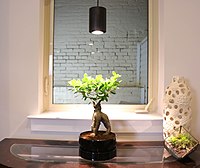
Photo from wikipedia
Abstract Vertical farming is a novel type of farming for fresh food production in the urban environment. Vertical farms are located in indoor environments with artificial solar radiation, completely insulated… Click to show full abstract
Abstract Vertical farming is a novel type of farming for fresh food production in the urban environment. Vertical farms are located in indoor environments with artificial solar radiation, completely insulated and protected from outdoor environmental conditions. Since cultivated plant species need many hours of light daily to meet their growth requirements, energy costs are very high, which can be an inhibiting factor for the advancement of the technology. In this research study, we tested the growth rate of basil plants (Genovese species) under two lighting systems. At first, the plants were grown under 16 h of continuous light, and in the second lighting system, under a photoperiod of 14 h with intermittent light. The light intensity was stable in both treatments. The purpose was to determine if intermittent light exposure could reduce the energy consumption of basil grown in indoor environments sufficiently and efficiently without adversely affecting the growth rate and biomass production of the plants. The results of the study showed that the intermittent lighting system, in which light was emitted intermittently in short (10-min) light cycles, did not affect negatively the quality and quantity of basil plants. It was found that the short light intervals were not sufficient to attain the optimal photosynthetic efficiency of the cultivation, while the overall photosynthetic rate did not decrease significantly under the indoor conditions. Finally, the evaluation of the energy footprint under various light treatments can have a positive impact on the energetic, economic, business, and ecological phases of indoor food production.
Journal Title: Food Control
Year Published: 2020
Link to full text (if available)
Share on Social Media: Sign Up to like & get
recommendations!